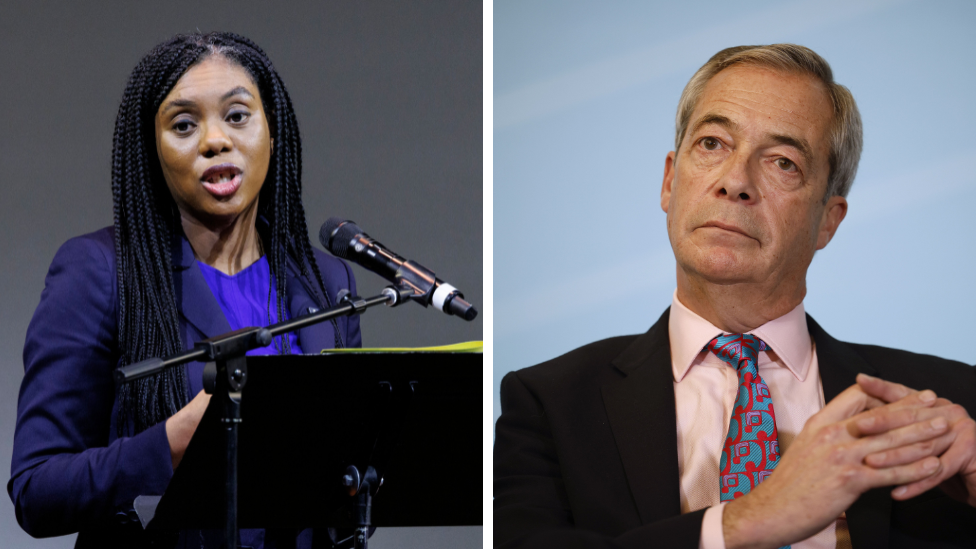Farage and Badenoch clash over membership figures

- Published
Conservative leader Kemi Badenoch has accused Nigel Farage of "fakery" over Reform UK membership numbers, after his party said they had surpassed the Tories in signed-up members.
A digital tracker on Reform's website shows its membership numbers have overtaken the 131,680 figure declared by the Conservatives earlier this year.
Badenoch said Reform's counter was "coded to tick up automatically".
Farage has demanded an apology from Badenoch after earlier saying he would "gladly invite" a firm to audit the party's membership numbers as long as the Conservatives did the same.
When the figure was announced on Boxing Day, Farage said it was a "historic moment".
Reacting to the growing tally on X, he said, external: "The youngest political party in British politics has just overtaken the oldest political party in the world."
Party chairman Zia Yusuf said Reform had broken the "centuries-long stranglehold on the centre-right of British politics by the Tories".
Musk in talks over Reform UK donation, says Farage
- Published17 December 2024
Is Reform UK's plan to get Farage into No 10 mission impossible?
- Published23 September 2024
Reform UK votes to give members more control
- Published21 September 2024
In a thread on X on Thursday, Badenoch said it was a "fake", and used a clock emoji to say that it had been "coded to tick up automatically".
"Farage doesn't understand the digital age," Badenoch added. "This kind of fakery gets found out pretty quickly, although not before many are fooled."
In a tweet responding to Badenoch, Farage said he had 5.4m social media followers and said she had 320,000.
Farage contended that Badenoch was "bitter, upset and angry" at the membership figures.
"We will gladly invite one of the Big 4 firms in to audit our membership numbers as long as you do the same," Farage said.
Later on Friday, he wrote on X that Reform's "membership numbers are correct and have now been verified by the media".
Reform had posted extracts from media outlets, including the Financial Times, the Telegraph and Sky News, saying the party had shown them evidence that the figures were accurate.
Farage added: "Kemi Badenoch says she wants to rebuild trust in politics. She should start by apologising to me."
Earlier this year, the Conservative Party said it had 131,680 members eligible to vote during its leadership contest to replace Rishi Sunak.
It was the lowest recorded membership for the party and a considerable drop from the 2022 leadership contest, when it boasted around 172,000 members.
A Conservative spokesman said Reform had "delivered a Labour government that has cruelly cut winter fuel winter payments for 10 million pensioners, put the future of family farming and food security at risk, and launched a devastating raid on jobs which will leave working people paying the price".
"A vote for Reform this coming May is a vote for a Labour council - only the Conservatives can stop this," he added.
A Labour spokesperson said that while the Conservatives and Reform picked "fights" the government was "getting on with delivering the change the British people voted for".
Membership numbers for all main political parties fell last year despite gearing up for this summer's General Election.
Although it still has the most members of any UK party, Labour saw its numbers dip below 400,000 for the first time since 2015.
Comparing party membership numbers can be "difficult", according to a research briefing published by the House of Commons Library, as there is no uniform definition of membership or way to monitor it.
The director of think tank More in Common, Luke Tryl, told the PA news agency that the metric was "opaque and murky".
He said Reform had "momentum" but indicated that it was not guaranteed that its membership translated into campaigners.
Former health secretary Sajid Javid told BBC Radio 4's Today programme on Friday that Reform is "a threat to all other political parties".
Asked whether Farage was likely to be a future contender for prime minister, Javid said nothing could be "sensibly ruled out".
He added it was important for all parties to "think about where Reform UK are doing better better than they expected - why is that happening and how can they try to answer some of those concerns that are coming up".
At the last general election in July, Labour gained over 200 seats but their vote share increased by less than two percentage points to 34%.
The Conservatives saw their vote share plummet by 20 points to 24% and the party lost 251 seats.
Reform came in third place by share of the vote on 14% but found it difficult to convert votes into seats. The party returned five MPs, including party leader Farage in Clacton.
By contrast, the Liberal Democrats' 12% vote share translated into 72 seats.